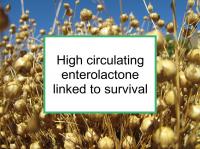A new long-term Italian study has reported that relatively high circulating enterolactone levels are associated with lower risk of death after a diagnosis of early stage breast cancer. The authors previously showed that high serum enterolactone levels are associated with reduced breast cancer risk in healthy women.
Enterolignans (enterolactone and enterodiol) are products of gut bacterial metabolism of lignans. Lignans are phytoestrogens found primarily in the woody or fibrous tissues of a variety of foods, including seeds, whole grain foods, and some fruits and vegetables.
The study included 300 women who were followed for a median of 23 years (range: 0.6 to 26.1 years). Levels of enterolactone were measured in preserved serum specimens obtained from the women before they underwent breast cancer surgery. The authors calculated the associations between enterolactone levels and risk of mortality using Cox proportional hazard and Fine and Gray competing risk proportional hazard regression models.
As of the end of follow-up, 180 patients had died, of whom 112 died from breast cancer. Enterolactone levels ≥10 nmol/l were found to be associated with lower risks of both breast cancer-specific death and all-cause mortality. The difference in mortality risk for different enterolactone levels was statistically significant, however it appeared to decline and lose significance after the first 10 years according to Cox regression analysis. On the other hand, competing risk analysis demonstrated that the risk of breast cancer-specific death remained lower in patients with high enterolactone levels.
The authors conclude that their findings are consistent with those of most recent published studies and provide further evidence that mammalian lignans might play an important role in reducing mortality of the patients with early stage breast cancer.
Please see our article on how to optimize your breast cancer diet for information on what to eat during all stages of treatment and recovery.
